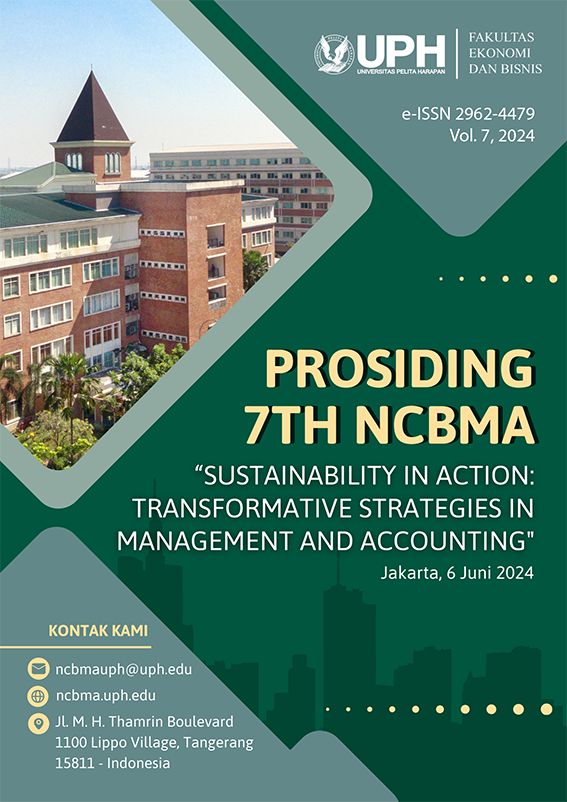GREEN GAS EMISSIONS AND CORPORATE GOVERNANCE: FINANCIAL INDUSTRY IN INDONESIA AND MALAYSIA
Keywords:
Green Gas Emission, Climate, Corporate Governance, Financial IndustryAbstract
The accelerating threat of climate change increases the importance of corporate commitment to the climate transition, including the important role of the financial industry in aligning with net zero emissions goals. The International Sustainability Standards Board has issued the latest standards in 2023 related to general requirements and a climate that encourages every organization to report a sustainability report. This research was conducted to determine the relationship between organizational governance and the emissions produced (green gas emissions) which will indirectly affect climate change. This research took samples from the financial industry and public companies contained in the S&P database. This research uses a quantitative approach to find out the relationship of organizational governance and emissions. The research will provide benefits to the literature related to the role of governance in the management of emissions produced by organization.
References
Aljughaiman, A. A., Cao, N. D., & Albarrak, M. S. (2021). The impact of greenhouse gas emission on corporate’s tail risk. Journal of Sustainable Finance & Investment, 68-85.
Azlan, S. S., Rahman, N. R., & Mohamad, M. (2023). Carbon Emission in Malaysia: Trends and Initiatives of Government. International Journal of Academic Research in Accounting, Finance, and Management Sciences, 318-329.
Hassan, O. A., & Romilly, P. (2018). Relations between corporate economic performance, environmental disclosure and greenhouse gas emissions: new insights. Business Strategy and the Environment, Volume 27, Issue 7 p. 893-909.
Indyk, M. (2022). Are the Companies Prepared for Sustainability Reporting under the ED IFRS S1 and S2? Evidence from Poland. Audit Financiar, Vol. 20, Iss. 4, 641-654.
Kock, C. J., Santaló, J., & Diestre, L. (2010). Corporate Governance and the Environment: What Type of Governance Creates Greener Companies? Journal of Management Studies, Volume 49, Issue 3, 492-514.
Li, W., Zheng, M., Zhang, Y., & Cui, G. (2020). Green governance structure, ownership characteristics, and corporate financing constraints. Journal of Cleaner Production, Volume 260.
Meena, R. (2013). Green Banking : As Initiative for Sustainable Development. Global Journal of Management and Business Studies., 1181-1186.
Miroshnychenko, I., Barontini, R., & Testa, F. (2017). Green practices and financial performance: A global outlook. Journal of Cleaner Production, 340-351.
Simamora, R. N., Safrida, & Elviani, S. (2022). Carbon emission disclosure in Indonesia: Viewed from the aspect of board of directors, managerial ownership, and audit committee. Journal of Contemporary Accounting, 1-9.
Stoelhorst, J. W. (2024). BEYOND PRIMACY: A STAKEHOLDER THEORY OF. Academy of Management Review, Vol. 49, No. 1, 107-134.
Syahfitri, A. R., & Risfandy, T. (2023). Peran direksi wanita dalam kebijakan dividen di institusi keuangan di indonesia. UMT Journal Management System, Vol. 4, pp 213-213.
Ullah, F., Jiang, P., Ntim, C. G., Shahab, Y., & Jiang, X. (2022). Female Directors' Foreign Experience and Environmental and Sustainable Performance. Asia-Pacific journal of financial studies, Vol. 51, Iss: 2, pp 169-193.
Vafaei, A., Henry, D., Ahmed, K., & Alipour, M. (2021). Board diversity: female director participation and corporate innovation. International Journal of Accounting and Information Management , Vol. 29, Iss: 2, pp 247-279.
Downloads
Published
Issue
Section
License
Copyright (c) 2024 Ilyona Risty

This work is licensed under a Creative Commons Attribution-ShareAlike 4.0 International License.

